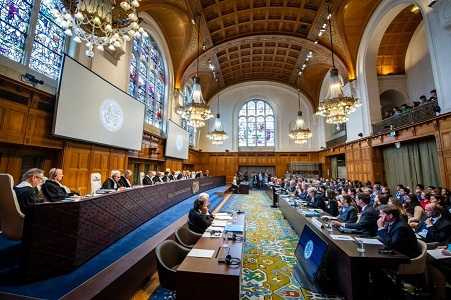
THE HAGUE/CARACAS, Dec 1 (Reuters) - Judges at the World Court on Friday ordered Venezuela to refrain from taking any action that would alter the situation on the ground in a potentially oil-rich territory that is the subject of a border dispute with Guyana, which controls the area.
The court did not expressly forbid Venezuela from going ahead with a referendum on Sunday over its rights to the region around the Esequibo river, as Guyana has requested.
But judges at the International Court of Justice (ICJ) - as the World Court is formally known - ruled that any move to alter the status quo should be stopped.
"The court observes that the situation that currently prevails in the territory in dispute is that Guyana administers and exercises control over that area," presiding judge Joan Donoghue said.
"Venezuela must refrain from taking any action which would modify that situation," she added.
Guyana's President Irfaan Ali hailed the court's ruling, while Venezuelan Vice-President Delcy Rodriguez said it was a victory for her country.
"As the court has made clear, Venezuela is prohibited from annexing or trespassing upon Guyanese territory or taking any other actions – regardless of the outcome of its referendum on December 3 – that would alter the status quo in which Guyana administers and controls the Esequibo region," Ali said in a statement.
The five-question referendum will go ahead, Rodriguez said on state television, adding that Venezuela wants a negotiated solution to the dispute.
The vote "will ratify that our rights over the Guayana Esequiba are irrevocable and unquestionable," Rodriguez said. "The truth of our homeland has triumphed."
The vote about the 160,000 square km (61,776 square mile) territory, which is largely thick jungle, has caused anxiety in Guyana, with the government urging citizens to keep calm.
Venezuela reactivated its claim on the area in recent years after the discovery of offshore oil and gas.
The maritime border between the two countries is also in dispute.
Venezuelan President Nicolas Maduro has vociferously encouraged voters to approve the referendum, in what political analysts say is a test of government support ahead of planned 2024 presidential elections, rather than a prelude to bellicose action.
The referendum, which is "consultative" and can be approved by simple majority, asks Venezuelans, among other things, if they agree to incorporate the region and create a state called Guayana Esequiba.
The analysts said the referendum will probably be approved, given the lack of any 'no' campaign and the likelihood that voters who are opposed will stay home.
Friday's ruling is the latest development in the larger border dispute. The ICJ said in April it had jurisdiction over the case, but a final ruling could be years away.




